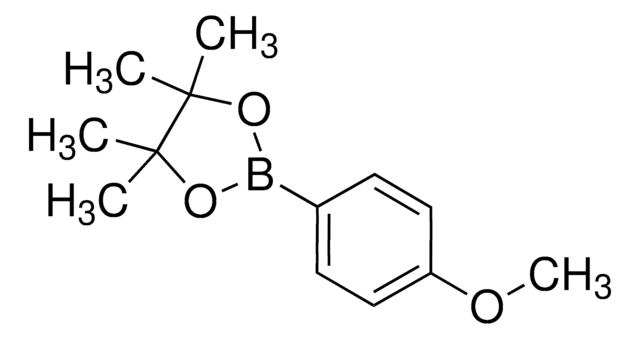594768
4-Methoxycarbonylphenylboronic acid pinacol ester
97%
Synonym(s):
4-Carbomethoxyphenylboronic acid pinacol ester, Methyl 4-(4,4,5,5-tetramethyl-1,3,2-dioxaborolan-2-yl)benzoate
Sign Into View Organizational & Contract Pricing
All Photos(1)
About This Item
Empirical Formula (Hill Notation):
C14H19BO4
CAS Number:
Molecular Weight:
262.11
MDL number:
UNSPSC Code:
12352103
PubChem Substance ID:
NACRES:
NA.22
Recommended Products
Quality Level
Assay
97%
form
solid
mp
77-81 °C (lit.)
functional group
ester
SMILES string
COC(=O)c1ccc(cc1)B2OC(C)(C)C(C)(C)O2
InChI
1S/C14H19BO4/c1-13(2)14(3,4)19-15(18-13)11-8-6-10(7-9-11)12(16)17-5/h6-9H,1-5H3
InChI key
REIZEQZILPXYKS-UHFFFAOYSA-N
Application
4-Methoxycarbonylphenylboronic acid pinacol ester can be used as a reagent:
- In Suzuki–Miyaura cross-coupling reaction with aryl halides to form C-C bonds.
- For the synthesis of biphenyl derivatives by selective ortho C-H arylation of ketones using Rh catalyst.
Storage Class Code
11 - Combustible Solids
WGK
WGK 3
Flash Point(F)
Not applicable
Flash Point(C)
Not applicable
Personal Protective Equipment
dust mask type N95 (US), Eyeshields, Gloves
Choose from one of the most recent versions:
Already Own This Product?
Find documentation for the products that you have recently purchased in the Document Library.
Bing Zhang et al.
Organic letters, 19(21), 5940-5943 (2017-10-20)
A general method for selective ortho C-H arylation of ketone, with boron reagent enabled by rhodium complexes with excellent yields, is developed. The transformation is characterized by the use of air-stable Rh catalyst, high monoarylation selectivity, and excellent yields of
Kelvin S L Chan et al.
Nature chemistry, 6(2), 146-150 (2014-01-24)
There have been numerous developments in C-H activation reactions in the past decade. Attracted by the ability to functionalize molecules directly at ostensibly unreactive C-H bonds, chemists have discovered reaction conditions that enable reactions of C(sp(2))-H and C(sp(3))-H bonds with
Synthesis of ester-substituted dihydroacridine derivatives and their spectroscopic properties
Suzuki R, et al.
New. J. Chem., 40(3), 2920-2926 (2016)
Our team of scientists has experience in all areas of research including Life Science, Material Science, Chemical Synthesis, Chromatography, Analytical and many others.
Contact Technical Service








